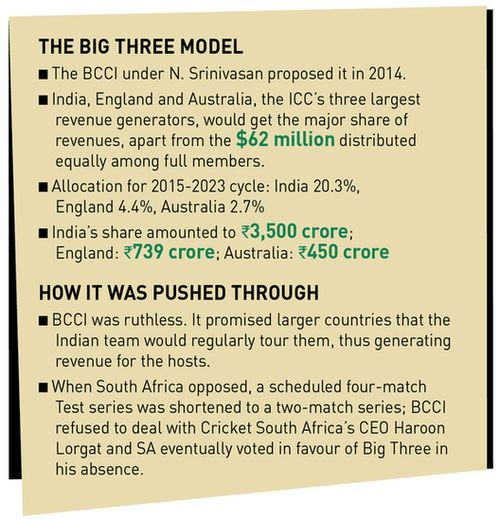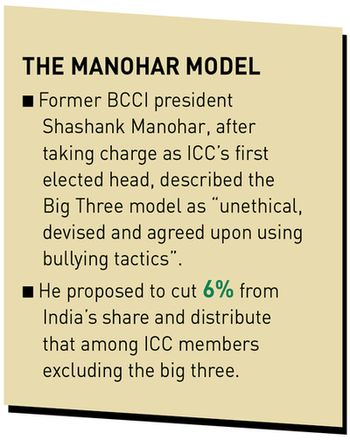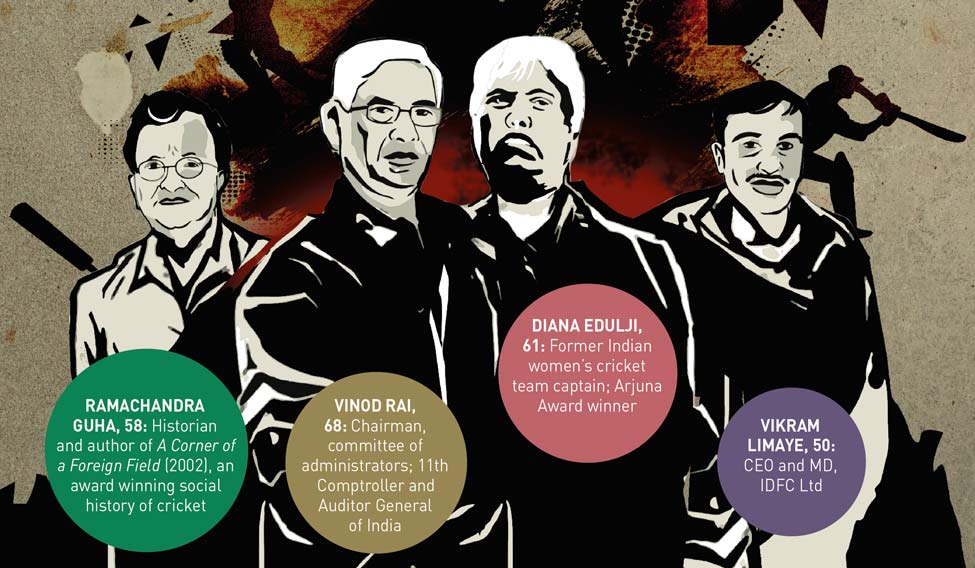Early this month, the board members of the International Cricket Council had a series of crucial meetings in Dubai. On the agenda was the scrapping of the ‘Big Three’ revenue sharing model, which the ICC had approved in 2014 when N. Srinivasan was president of the Board of Control for Cricket in India.
The Big Three model, so named because it proposed to pay a proportionally larger share of the ICC’s revenues to its three largest revenue-generating members, had been on the chopping block for some time. Last year, after he was elected as ICC chairman, Shashank Manohar began a comprehensive review of the model, which was perceived to be unfair to other members (see graphics). A rollback decision was expected in Dubai.
On the sidelines of the ICC meetings in Dubai was Prasanna Kannan, former chief financial officer of the Indian Premier League and an employee of India Cements, a company Srinivasan owns. At the hotel where the meeting was being held, he walked up to Giles Clarke, president of the England and Wales Cricket Board. Kannan wanted to discuss the Big Three model with Clarke. The Englishman, however, was not so keen.

And understandably so. Kannan was part of the Srinivasan era in cricket, which was widely seen as a time when the BCCI dominated the ICC and pressured other members to toe its line. His presence in Dubai sent the message that, even though Srinivasan was no longer in the thick of things in Indian cricket, the BCCI old guard was far from being finished. The presence of BCCI joint secretary Amitabh Choudhary and treasurer Anirudh Chaudhry, who were part of the Srinivasan camp, also indicated this.
Choudhary attended the meeting of ICC chief executives, even though BCCI chief executive officer Rahul Johri was officially listed in the ICC’s website as the authorised representative from India. The Supreme Court had, as a one-time allowance, said that both the officials could also attend the ICC meetings along with Vikram Limaye, member of the committee of administrators appointed by the court to run the BCCI.

Limaye, managing director and CEO of IDFC Ltd, represented India at the meeting of the ICC board of directors, which was chaired by Manohar. All members present in the meeting were deeply impressed with Limaye and the way he had prepared for the meeting, despite having been given just a few days to do it. He was assisted by Johri and M.V. Sridhar, BCCI general manager (cricket operations). Apparently, Limaye has been so impressive that the BCCI’s committee of administrators have been receiving emails from ICC members appreciating him for his observations.
More importantly, Limaye witnessed at the meeting the mistrust and antipathy borne by other ICC full members towards the BCCI. It is in this context that Vinod Rai, chairman of the committee of administrators, told THE WEEK that it would be key to ensure that India does not lose its primacy and risk getting alienated further within the ICC by taking an extreme position with regard to the revenue sharing model. As it turned out, the committee had little leeway to get the new revenue deal postponed, having taken charge just two days before the meeting in Dubai. The new revenue deal was presented as a fait accompli to Limaye.
As per the new model, India would get around Rs 2,500 crore from ICC revenues from 2015 to 2023—Rs 1,000 crore less than what Srinivasan had bargained for. Limaye, who voted against the new model, said “there was no scientific basis behind the percentage distribution allocation that was being proposed [under the new model] other than good faith and equity”.
While the proposals were accepted in principle by way of a 7-2 vote, the meeting also allowed Limaye and other members to discuss it clause by clause, and suggest changes in the ICC’s next board meeting on April 17.
The new model is likely to face opposition from the BCCI old guard. “Manohar has no finance background,” said an influential member of a key state association. “This new model is utter nonsense.”

There is little doubt that the committee headed by Rai will face resistance of the same magnitude that the Lodha committee had faced while ushering in reforms in the BCCI. The aim will be to put up roadblocks and frustrate the efforts of the committee. It is in this context that member associations of the BCCI are planning a meeting to discuss how the new ICC proposals could be blocked.
There also seems to be a sustained public relations campaign against the committee. Interestingly, the BCCI, under the previous administration, had put in charge of its publicity a top PR firm headquartered in Mumbai. It still continues with the mandate, but where is it getting its briefs from remains a big question mark. It is learnt that the committee, in its bid to be completely transparent, has decided to send out media releases after every meeting.
Rai and his colleagues are undeterred by the resistance from within the BCCI. They have been in constant touch with each other after their last meeting in Delhi on February 1. Rai is reportedly preparing a blueprint on how to move forward and assign each member a specific role. The next meeting of the committee will take place in Delhi on February 17.
A top priority for the committee is the successful organisation of the Indian Premier League. The timelines for player auctions and franchise workshops have been cleared. The committee has reiterated that the IPL will start on April 5, as originally planned. Once that is taken care of, it will focus on implementing reforms.
The committee has also shown its resolve by shutting down the BCCI’s Delhi office, from which former BCCI president Anurag Thakur and secretary Ajay Shirke had functioned. “This was unnecessary expenditure. The BCCI operates through its headquarters in Mumbai and there was no need to have this office,” said Diana Edulji, committee member and former captain of the Indian women’s cricket team.
A senior BCCI official said time was of the essence in implementing reforms. “If the Supreme Court is serious about reforming Indian cricket, then time is key,” said the official. “The longer it takes, the more stumbling blocks former officials would create. A strong message needs to be sent. The committee should act against officials who have misused funds. The rest will then fall in line.”







